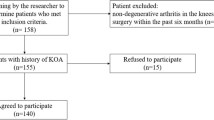Summary
The purpose of this research was to investigate psychological factors associated with ankylosing spondylitis (AS), focusing on possible differences between members and nonmembers of self-help groups for people with this form of chronic disease. Analysis of health locus of control beliefs along 3 dimensions: internality powerful others and chance, showed that members of National Ankylosing Spondylitis Society (NASS) self-help groups placed significantly less reliance on “powerful others” for control of health than did nonmembers. This pattern of beliefs may be related to the nature of AS, which is incurable, progressive, unpredictable and difficult to diagnose. It may therefore appear to the patient that health care professionals have little to offer them. People who join a self-help group may also feel less reliant on medical personnel to control their health. Group members also differed from nonmembers in terms of belief in the value of exercise for AS, frequency of exercise, tendency to seek information about the disorder and perceived social support. A combination of psychosocial and medical variables discriminated between members and nonmembers at a rate of 71.9% accuracy. Results indicate that NASS self-help group members appear to comply more with exercise treatment and also receive a valuable source of social support from fellow members. This investigation demonstrates the utility of including psychosocial variables in the study of chronic disease.
Similar content being viewed by others
References
Anderson, K.O., et al., Rheumatoid Arthritis: Review of Psychological Factors Related to Etiology, Effects and Treatment. Psychol Bull, 1985, 98, (2), 358–387.
Achterberg-Lawlis, J. The Psychological Dimensions of Arthritis. J Consult Clin Psychol 1982, 50, 6, 984–992.
Deyo, R.A. Compliance with therapeutic regimens in Arthritis: Issues, current status and a future agenda. Semin Arthritis Rheum 1982, 12, (2), 233–244.
DiNicola, D.D., DiMatteo, M.R. Practitioners and compliance with medical regimens: A social psychological perspective. In: Handbook of Psychology and Health, Vol. IV, Eds: Baum, A., Shelley, E.T., Singer, J.E., Lawrence Erlbaum Associates, London, 1984.
Mechanic, D. Future issues in health care, social policy and the rationing of medical services, Macmillan, 1979, 146–158.
Barlow, J.H., Macey, S.J., Struthers, G. Health locus of control beliefs and treatment adherence amongst ankylosing spondylitis (AS) patients. Clin Rheumatol, 1990, 9, 2, 32.
Wallston, K.A., Wallston, B.S., Who is responsible for your health? The construct of health locus of control. In: Social Psychology of Health and Illness, Editors: Sanders, G., Suls, J., Hillsdale, N.J., Erlbaum, 1982.
Slenker, S.E., Price, J.H., O'Connell, Health locus of control of joggers and nonexercisers, Percept Mot Skills, 1985, 61, 323–328.
Baeklund, F., Lundwall, L. Dropping out of treatment: A critical review. Psychol Bull, 1975, 82, 738–783.
Sarason, B. et al., Inter-relationships of social support measures: Theoretical and pratical implications. J Pers Soc Psychol, 1987, 52, 813–832.
Given, C.W., Measuring the social psychological health states of ambulatory chronically ill patients: Hypertension and diabetes as tracer conditions, J Community Health 1984, 9, 3, 179–195.
Rodin, J., Salovey, P. Health psychology, Ann Rev Psychol 1989, 40, 533–579.
van der Linden, S.M., Ferraz, M.B., Tugwell, P. Clinical and functional assessment of ankylosing spondylitis. Spine: State of the Art Reviews, 1990, 4, 3, 583–593.
Nemeth, R., et al. Ankylosing spondylitis (AS)—An approach to the measurement of severity of outcome: Ankylosing spondylitis assessment guestionnaire (ASAQ) — A controlled study, Br J Rheumatol 1987, 28, (S1), 69.
Friedman, H.S., Where is the disease-prone personality? Conclusions and future directions, In: Personality and disease Ed: H.S. Friedman, NY, Wiley, 1990.
Blalock, S. et al. Validity of the center for epidemiological studies depression scale in arthritis populations, Arthritis Rheum 1989, 32, 8, 991–997.
Wallston, K.A., Wallston, B.A., DeVellis, R., Development of the multi-dimensional health locus of control (MHLC) scales. Health Educ Monogr 1978, 6, 161–170.
Funch, D.P., et al, Assessment of a short scale to measure social support. Soc Sci Med 1986, 23, 3, 337–344.
Radloff, L.S. The CES-D Scale: A self-report depression scale for research with the general population. Appl Psychol Measurement, 1977, 1, 3, 385–401.
Downie, W.W., et al., Studies with pain rating scales, Ann Rheum Dis 1978, 37, 378–381.
Fries, J.F., et al. Measurement of patient outcome in arthritis. Arthritis Rheum 1980, 23 (2), 137–145.
Meenan, R.F., Gertman, P.M., Mason, J.H., Measuring health status in arthritis: the arthritis impact measurement scales. Arthritis Rheum 1980, 23, 2, 146–152.
Sheehan, N.J., et al. A lack of correlation between clinical disease activity and erthrocyte sedimentation rate, acute phase proteins or protease inhibitors in ankylosing spondylitis, Br J Rheumatol 1986, 25, 171–174.
Roskam, S., Application of health locus of control typology approach toward predicting depression and medical adherence in rheumatoid arthritis, unpublished doctoral dissertation, Vanderbilt University, Nashville, TN. 1986.
Reid, D.W. Participatory control and the chronic illness adjustment process. In: Research with the locus of control construct, Vol. III, Ed: Lefcourt, H., New York, Academic Press, 1984.
Author information
Authors and Affiliations
Rights and permissions
About this article
Cite this article
Barlow, J.H., Macey, S.J. & Struthers, G. Psychosocial factors and self-help in ankylosing spondylitis patients. Clin Rheumatol 11, 220–225 (1992). https://doi.org/10.1007/BF02207961
Received:
Revised:
Accepted:
Published:
Issue Date:
DOI: https://doi.org/10.1007/BF02207961




